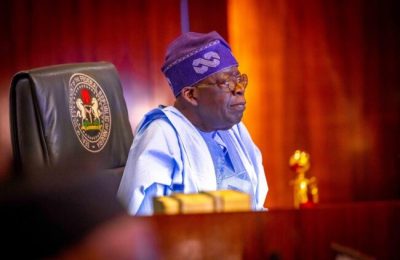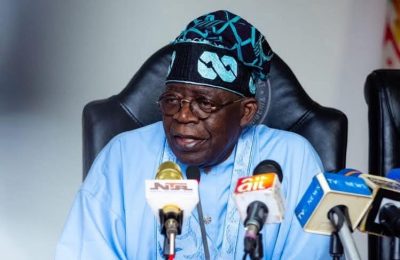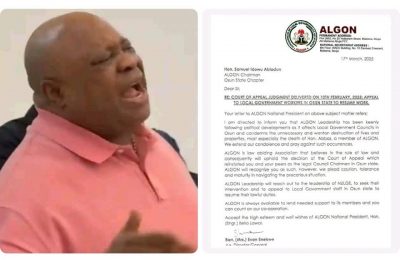 0
0

Mai Mala Buni, seer and dreamer, governor of Yobe State and National Caretaker Chairman of the All Progressives Congress(APC), has unfolded plans by the party to rule Nigeria for the next 32 years.

His projection is that the ruling party should be in the saddle for eight terms without interruption. Technically speaking, Nigeria is a two-party state. The country’s historical antecedents, its pattern of alliances, coalitions, mergers and fusions lend credence to its disposition to the dominance of two parties, with other smaller or mushroom platforms merely serving as spectators on poll day.
Buni’s permutation is that if the ruling party puts its house in order and reconnect with Nigerians who gave President Muhammadu Buhari the mandate to steer the affairs of the nation-state in 2015 and 2019, the opposition party, Peoples Democratic Party (PDP), which is also a formidable party with tap roots across the country, can be kept away from power.
In other words, if APC can reform itself and forge reconciliation, and if the government it has midwifed performs exceptionally and excellently to the admiration of majority of Nigerians, it may continue to beat other parties in a free and fair election.
This brand of wishful thinking was once expressed by Prince Vincent Ogbulafor, former Minister of Economic Planning and Chairman of the PDP, shortly after the 2007 polls.
During the controversial general elections conducted by the National Electoral Commission (INEC) Chairman Prof. Maurice Iwu, losers were declared winners. It was reminiscent of the landslide and moonslide victory of the notorious National Party of Nigeria (NPN) in the Second Republic.
PDP leaders were excited at the victory won through the back door. But, the electoral falsehood was later dismantled by the court and the party was back to square one in some states.
The elated and boastful gladiator, Ogbulafor, later became a casualty of internal contradiction and crisis in the then ruling party. Allegations of past misdeeds as a minister resurfaced, and they were amplified by his detractors. Ultimately, he was shoved aside. His prediction perished with his party leadership career. Although Ogbulafor envisioned six decades of dominance for his party, PDP lost power barely eight years after the reckless prediction.
The first mistake was that PDP was not only using power, power begun to use the party. Its Federal Government lost track; it became weak, corrupt, inept, clueless and fragmented, especiallyafter the demise of President Umaru Yar’Adua.
Then, the party was seized by a monumental crisis. Ogbulafor’s successor, Okwesile Nwodo, could not also last in office. The eminent businessman and old political warhorse, Alhaji Bamanga Tukur, who wanted to salvage the party by rescuing it from the jaw of the PDP Governors’ Forum by democratising and expanding its sources of funding, was checkmated. The embattled president, Dr. Goodluck Jonathan, was said to have beckoned on his ally to vacate office, albeit reluctantly. But, Tukur never resigned. He just left the office to allow the governors to have their way.
In post-Tukur era, the table turned against President Jonathan. The governors packaged a virulent attack against the party leader. He lost control of the party.
After weakening the platform, some of the governors temporarily called it quits with the party. They teamed up with the opposition to abort its dream to rule for 60 years, or for eternity. Up to now, the crisis is not over. It has been assuming new dimensions. The party is yet to recover.
Is the APC learning from the mistakes of its predecessor in office? Is the ruling party inffaliable?
Evidently, it does not appear that the ruling party is really planning for survival, judging by its handling of major internal issues. It may be that its handlers are evading reality. Lack of proper and realistic self-assessment may give rise to blurred judgement and false hope.
A united APC achieved victory in 2015. Subsequently, things started falling apart.
A big party where the president can ask members to vote for him at the presidential election while urging them to also vote for candidates of their choice running in other opposition parties has devalued itself. That approach could only precipitate conflicts instead of forging unity and harmony. Winning or losing elections under that kind of atmosphere can only compound intra-party squabbles. More importantly, an incalculable damage may have been done to party supremacy and discipline. That precedent can be cited in the future by clever chieftains, to the detriment of the platform.
A party that can call an emergency meeting to raise an unelected national caretaker committee and endow it with a curious power to dissolve duly elected party structures at the ward, council levels leaves much to be desired. The seed of bitterness is sowed. The absence of “party democracy” smacks of systematic dictatorship.
A party without a Board of Trustees; a party where the National Caucus is dormant connotes an incomplete edifice. Their roles are lost, thereby creating a gap in structural functionalism. Besides, even if it is constituted, the envisaged APC BoT may be a house of Babel, judging by the conflagration.
A party of fighting governors and senators create an impression of visible cracks that have implications for future electoral fortunes. The lack of amity has taken tolls, particularly on Zamfara, Ondo and Rivers chapters. It attests to the weakness of crisis resolution mechanism.
A party where some new entrants suddenly become contact committee members within a week of defection does not convey seriousness. Who are they going to contact and reconcile? How much of the party do they know or understand? Accommodation for new members and harmonisation are good. But, when defectors who are one or two weeks old in APC are saddled with reconciliation, it is laughable.
What is emerging from the scenario is that APC is a party whose reconciliation efforts pale into window dressing.
A hijacked party where some committed founding chieftains now complain subtly about marginalisation and exclusion creates an impression of “use and dump.”
A party that is polarised by the ordinary registration of members and validation of membership register, as manifested by the disagreements across some dispirited chapters, cannot be said to be laying a good foundation for the future.
A party that cannot hold a mid term convention, and now, the mandatory national congress for the election or selection of party leaders, which it has postponed twice, creates doubt and anxiety within its fold.
How popular is APC today? It’s current ratings contrast with its enjoyment of public enthusiasm six years ago. How can a crisis ridden party assist the Federal Government it gave birth to to govern well? How is the party monitoring the government to ensure that its campaign promises of reinvigorated anti-corruption battle, restoration of security, economic revival and restructuring or devolution of powers are kept?
The performance of the Buhari administration is a criterion for assessing the performance or achievement of the ruling party.
The government inherited a mess from the previous government. Indeed, the previous administration was a liability. The victory of Gen. Muhammadu Buhari rekindled hope. Today, without mincing words, there is a huge gap between expectation and reality.
Buhari has scored high points in infrastructural development. It is also doing it’s best in fighting corruption. But, how has the economy fared? Or how have Nigerians fared under the ‘wonderful economy’ that had exited recession? What is the import of an improved economy that does not translate into a general improvement in wellbeing?
Electricity tariffs are high. Fuel price is on steady increase. The Bureau of Statustics paint an awful picture of soaring unemployment rate. Graduates roam the streets. Three square meals are not for the poor. Poverty continues to grow in leaps and bounds. Many social intervention programmes are like a drop in the ocean.
The hope of a secured country is dashed. Cattle rustling results into deadly herder/farmer clashes. Banditry has become a big business. Kidnappers are on the prowl. Schools are now unsafe. Policing is defective. State or community policing is being approached with great reluctance in a federal state that is actually unitary.
Are all these not enough troubles? This is a period of boring social condition.
Should all these challenges not agitate the ruling party and its national caretaker chairman, who is nursing a dream of hegemony for 32 years?
Advertise or Publish a Story on Nationnewslead: Kindly contact us @ Nationnewslead@gmail.com Call or Whatsapp: 08168544205, 07055577376







